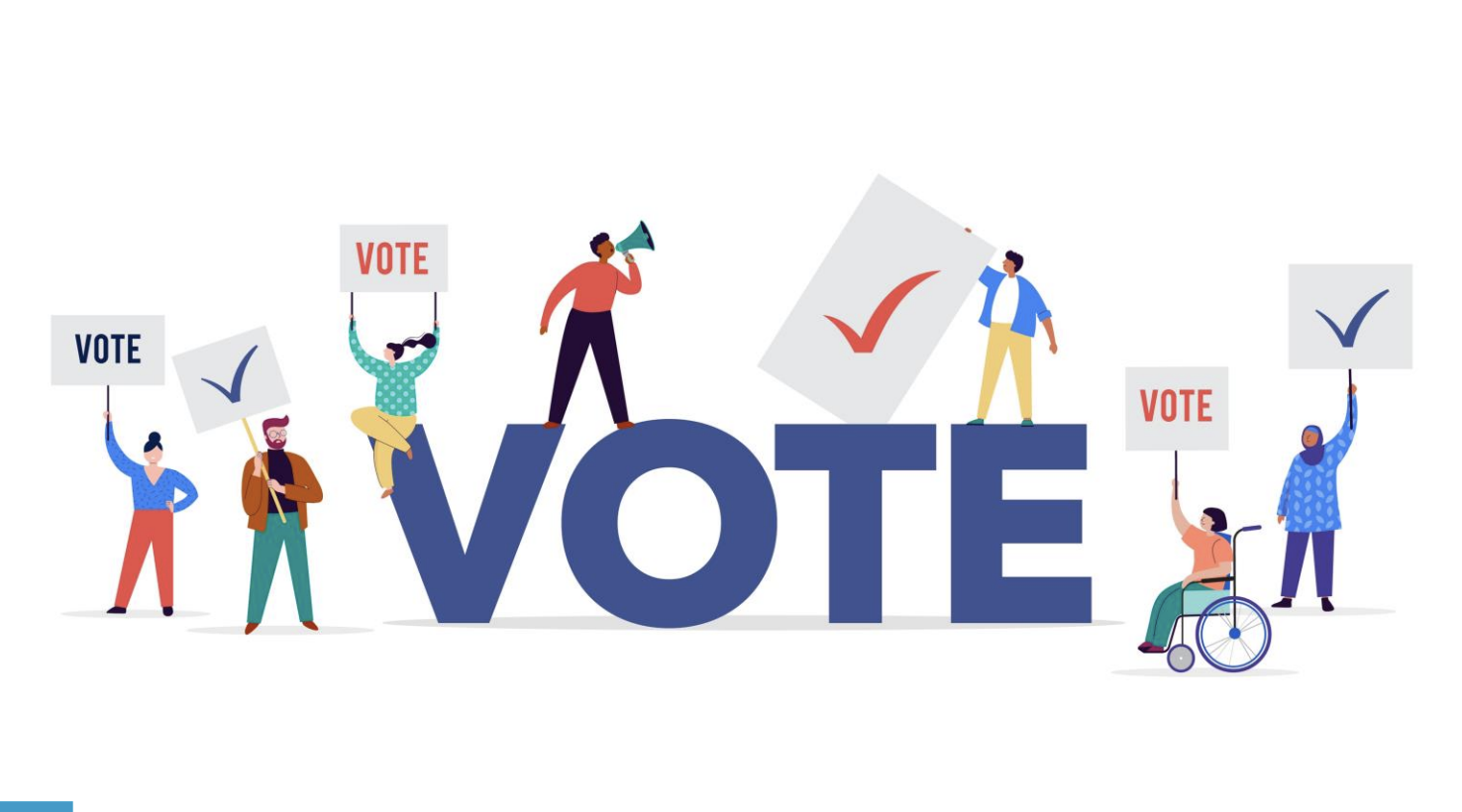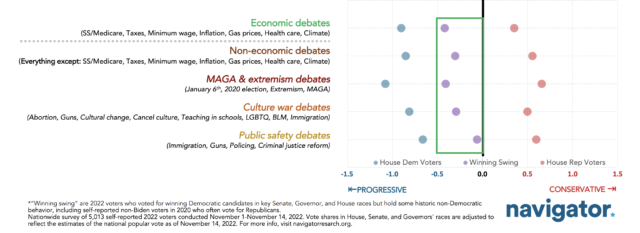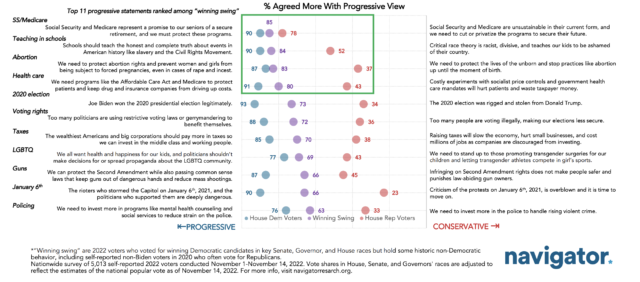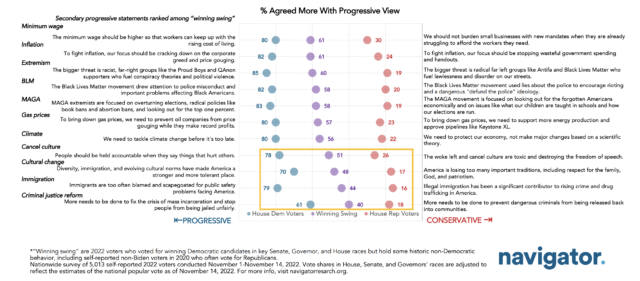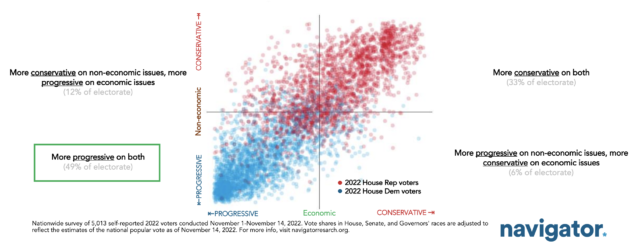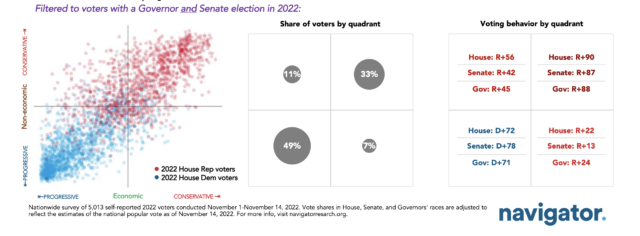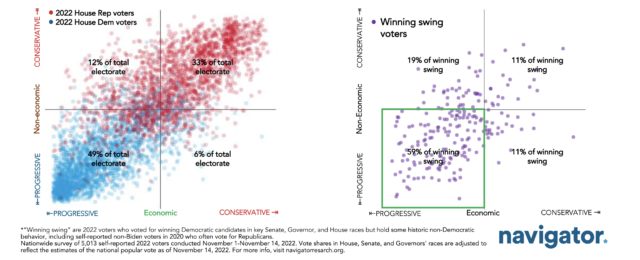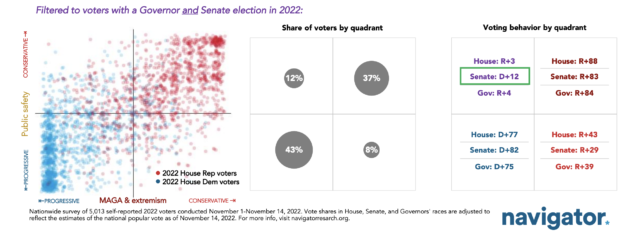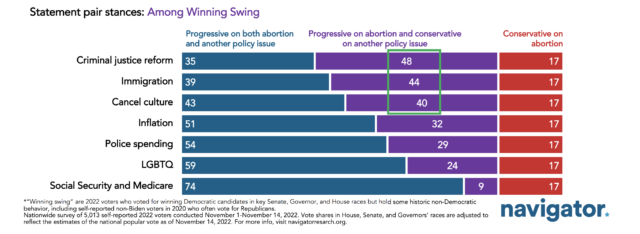What We Did: 2022 Midterm Voters Survey
The slides in this presentation are based on interviews with 5,013 registered voters who had already voted or planned to vote in the November election, with interviews conducted November 1st through November 14th . Support for Democratic candidates and Republican candidates in elections for Governor, Senate, and the House of Representatives have been adjusted to reflect the actual expected results as of November 14th . The analysis aims to provide a new tool for Americans to understand what happened in the 2022 election, why it happened…and what’s next.
What We Did: Issue Dimension Analysis
In 2020, Navigator looked at how the major issue debates of the presidential election shaped voting behavior. The analysis, modeled after Lee Drutman’s 2016 Voter Study Group analysis, showed the ways in which many ticket splitters and vote switchers tended to be cross pressured, falling on opposite sides of the ideological spectrum for “Economic” issues vs. “Social and Cultural” issues.
In 2022, Navigator Research decided to step back and assess a broader set of issues to illustrate the cross-pressures that defined the decisive swing voters in competitive House, Senate, and Gubernatorial races – beyond the usual “social issues” and including several dimensions of the public safety debate as well as political extremism and “MAGA.” The slides that follow dig deeper into some of these debates to paint a picture of the 2022 electorate – particularly those crucial swing voters who helped to deliver some historic surprise Democratic victories.
Previous 2022 midterm Navigator analyses have demonstrated the importance of abortion, inflation, and political extremism to voters in this election. This analysis takes a different approach, exploring the behavior of swing voters whose opinions on issues like these – and others – might have sent them different directions (to the right or the left) if the debates had been more salient for those voters in the campaigns for House, Senate, or Governor
Key takeaways
- Nearly half of all voters in the 2022 midterm electorate sided more with progressive arguments in both economic and non-economic debates, while just a third were conservative on both sets of debates.
- Among “winning swing” voters who clinched victories for Democrats in tough races, they held more progressive views on a range of issue areas, including the economy as well as non-economic debates. They were slightly more conservative on issues related to public safety, but so were House Democratic voters.
- Those who were more progressive on both economic and non-economic issues (49%) went for Democrats by at least 70 points in House, Senate, and Gubernatorial races; those more conservative on both (33%) were more consolidated behind Republicans by at least 85 points in all races. Voters who were more conflicted between economic debates and non-economic issues also backed Republicans by sizable margins.
- Majorities of voters – including critical “winning swing voters” – held progressive views on abortion, but many pro-choice voters who helped to clinch victories for Democrats in tough races were not progressive on other issues.
The Swing Voters Democrats Won Over Mostly Agreed With Them; MAGA & Extremism Debates Were Most Polarizing
“Winning swing” voters who helped Democrats win tough races – along with voters who backed House Democrats nationwide – were most progressive on the economy and MAGA & extremism, and less progressive on public safety issues.
- Of the issue debates tested, House Republican voters were most progressive on economic debates though still conservative. They were furthest away from House Democratic voters and “winning swing” in their conservatism on MAGA & extremism.
On Many Issues, Democratic House Voters and “Winning Swing” Voters Agreed More With Progressive Viewpoints
Though They Backed Democrats in Key Races, These Swing Voters Were Conflicted on Crime, Immigration, Cultural Change
Nearly Half of 2022 Voters Fell on the Progressive Ends of Both Non-Economic and Economic Sets of Issue Debates
Looking at cross-pressured voters, we see a similar trend to past elections – there is a greater number of voters who are progressive on economics, conservative on other issues (12% of electorate) than there are the reverse (6% of electorate).
Half of Voters in States With Governor and Senate Races Leaned Progressive on Issues and Strongly Favored Democrats
Republicans continue to do better with voters who fall into the upper-left quadrant (conservative on non-economic issues, progressive on economic issues) than with voters in the bottom-right quadrant (progressive on non-economic issues, conservative on economic issues).
- Those who are conservative on both economic and non-economic debates are more consolidated behind Republican voters than voters who are more progressive on both sets of debates.
Three in Five “Winning Swing” Voters Were More Progressive on Both Economic and Non-Economic Issues
While these “winning swing” voters have some historically non-Democratic voting behavior, only 11% are more conservative on both economic debates and non-economic debates.
Democrats Were Most Competitive Among Those Conservative on Public Safety, Progressive on MAGA/Extremism
The 12% of voters overall in states with Senate and Governor’s races in 2022 who were progressive on MAGA & extremism but conservative on public safety issues voted for Senate Democrats by a margin of 12 points, though supported House Republicans and Republican Governors by 3 and 4 points each, respectively
Many Who Backed Democrats in Key Races Were Pro-Choice, But Conservative on Other Issues Like Criminal Justice Reform
On issues like Social Security and Medicare, many “winning swing” voters naturally fell into the progressive camps of both that issue and abortion (74%). However, many “winning swing” were conservative on other issues while more progressive on abortion: a plurality of “winning swing” were progressive on abortion and conservative on criminal justice reform (48%), 44% were progressive on abortion but conservative on immigration, and 40% were progressive on abortion but conservative on cancel culture.
About The Study
Global Strategy Group conducted an online survey of 5,013 registered voters from November 1-November 14, 2022, with respondents recruited from opt-in online panel vendors. Respondents were verified against a voter file and special care was taken to ensure the demographic composition of the sample reflected that of the expected 2022 electorate in the House, Senate, and Governor’s races. The vote shares for Democrats and Republicans among self-reported 2022 voters were also adjusted to reflect a preliminary estimate of the actual results of the 2022 elections.
